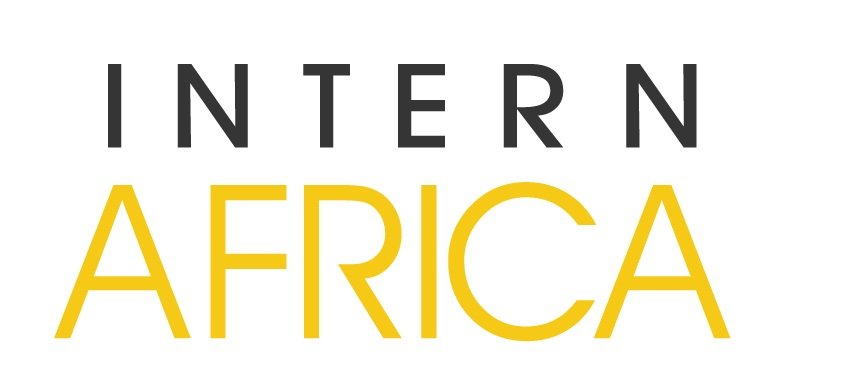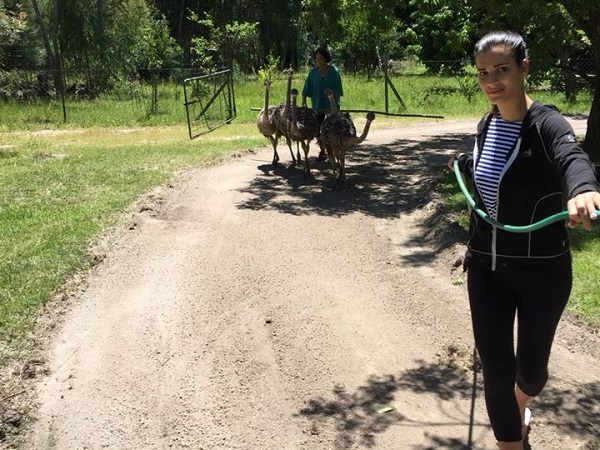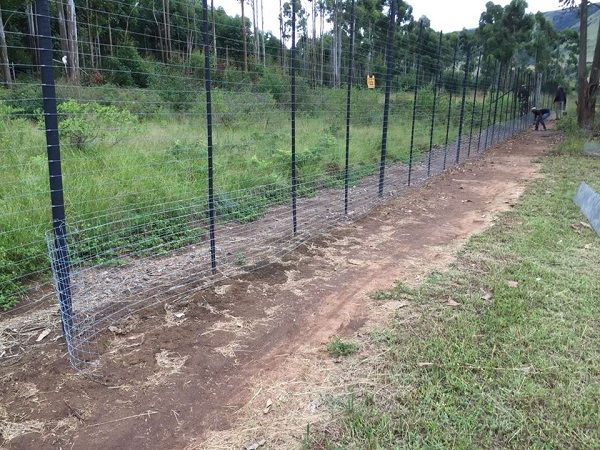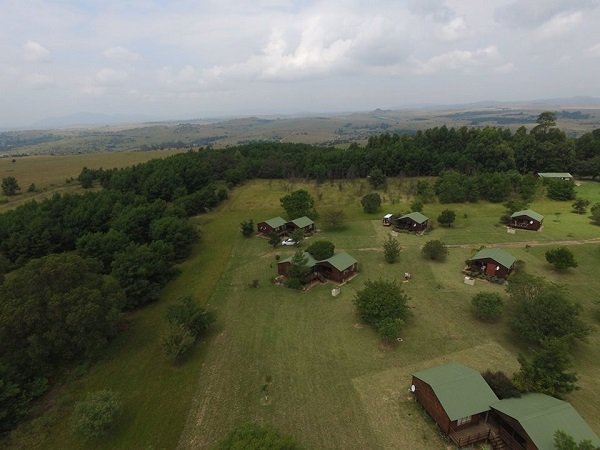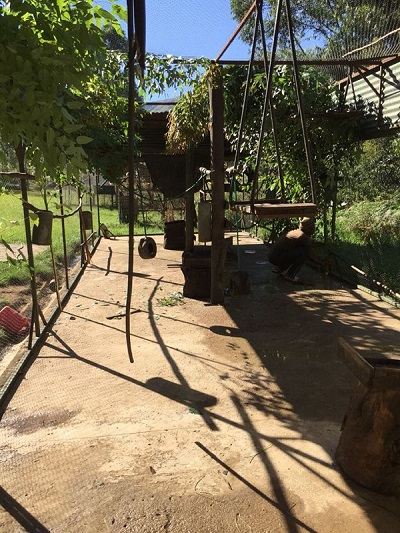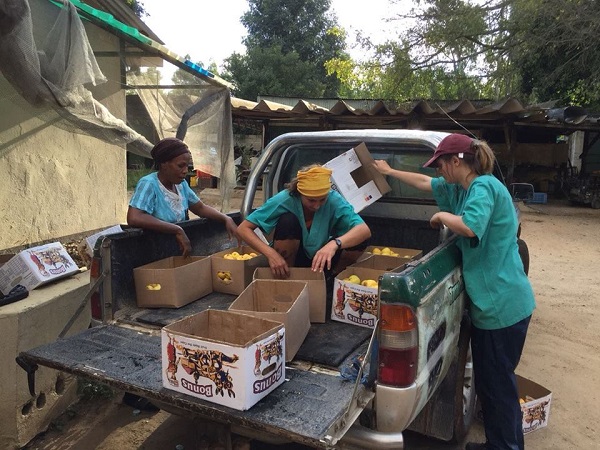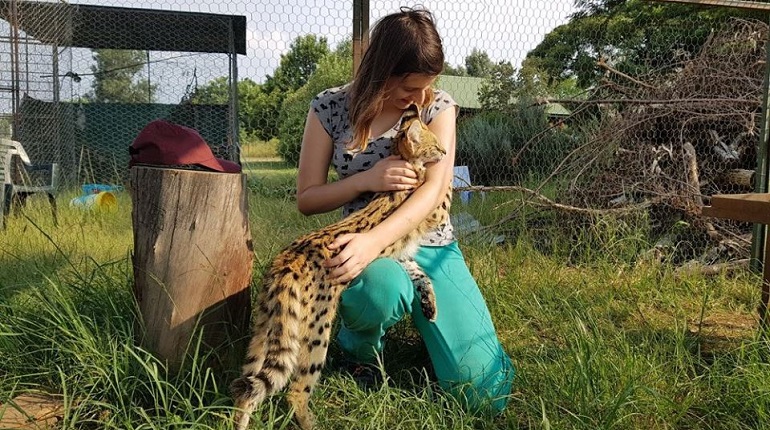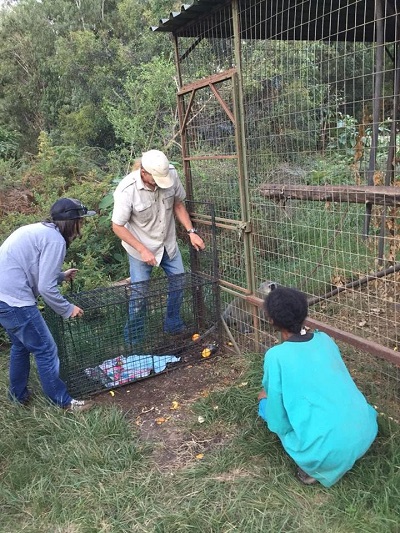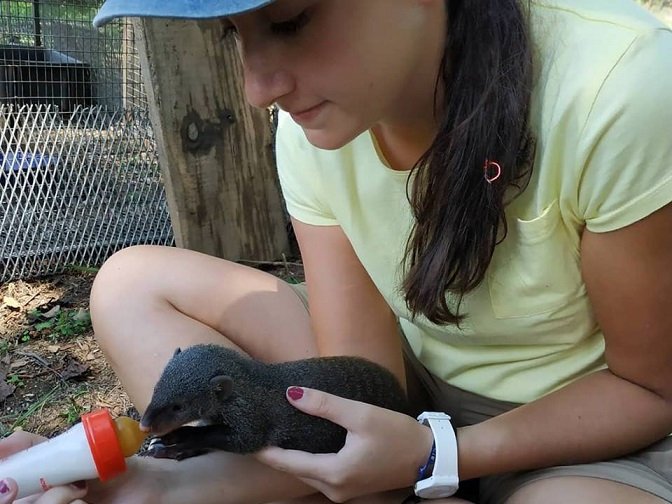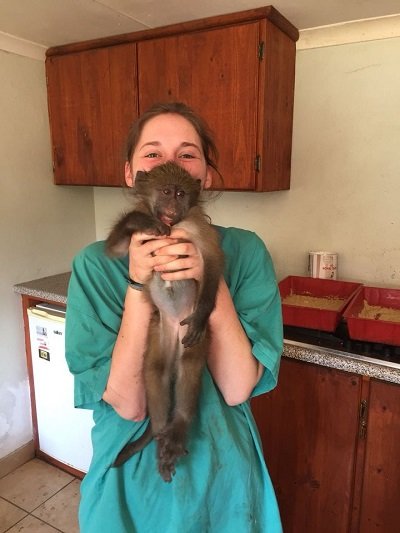South Africa
PRIMATE WILDLIFE REHABILITATION PROGRAM
ANIMAL SANCTUARY VOLUNTEER
Consider animal volunteering at this sanctuary in South Africa. The wildlife rescue and rehabilitation centre has been operational for almost 10 years 2010 and is based in the Mpumalanga region of South Africa. The only primate rehabilitation in the province, thus the work focuses mainly on vervet monkeys. Other wildlife that needs to be rescued is also taken in and to date have successfully worked with mongoose, many antelope and bird species, warthog, bush pigs, bush babies, small predators and reptiles.
Involved in the running and day-to-day operations of the centre, you are the essential link in the success of this amazing initiative. New experiences, feeding and food preparation for the animals and cleaning their enclosure can be expected, all for the health and well-being of the animals that call this centre their home, even temporarily.
The love and support of the generous volunteers at this centre make it possible to serve the 100’s of desperate animals in need of their care and medical attention. The lack of funding and support from the government make the funds received from volunteer’s all the more precious, and your hard work, dedication and support make the rehab the success that it is today.
Involved in the running and day-to-day operations of the centre, you are the essential link in the success of this amazing initiative. New experiences, feeding and food preparation for the animals and cleaning their enclosure can be expected, all for the health and well-being of the animals that call this centre their home, even temporarily.
The love and support of the generous volunteers at this centre make it possible to serve the 100’s of desperate animals in need of their care and medical attention. The lack of funding and support from the government make the funds received from volunteer’s all the more precious, and your hard work, dedication and support make the rehab the success that it is today.
- Age: min.18 - max. 70
- Location: Badplaas, Mpumalanga region
- Requirements: You need to be physically fit and at least 18 years old. Furthermore, you don’t mind to get your hands dirty.
- Group size: max 15 participants
- Project duration: 1 week - 12 weeks
- Laundry: Laundry can be done on Fridays at a cost of R20 per bag/load
- WIFI: There is no WIFI but there is good 3G signal, you can purchase a local sim card at the airport
- Linen/towels: Linen and towels are provided.
Location
The centre is based in Badplaas, Mpumalanga, about a 5 hour drive from Johannesburg.
Requirements
You need to be physically fit and at least 18 years old. Furthermore, you don’t mind to get your hands dirty.
Guidance
There will be a volunteer guide / leader in charge to ensure that the program run smoothly, to give advice and provide leadership.
Tasks
Caring for more than 100 animals on a daily basis is a costly exercise, and volunteers can rest assured that their generosity is never overlooked or under appreciated. Your monetary donation and your most precious time are highly valued and sought-after commodities that make the world of difference, to both the animals and those staff members permanently located at the centre.
While at the centre you will be learning new skills and gaining hands-on experience, at the same time meeting new people and sinking your teeth into a totally new way of life. You will be warmly welcomed and treated as a professional member of the team, required to complete task to the absolute best of your ability, and to make the biggest difference in the limited time that you have at the centre. As a volunteer you will gain hands-on experience in working with animals and learn about African endangered wildlife. Listening and learning, and using your intuition are always welcome and recommended to ensure the successful running of the centre in its entirety.
The animals at the centre come first, and with this in mind, no day is ever really structured the same. Normal working hours for the volunteers starts at 7am, and continues throughout the day ‘till around 5pm. It is good to keep in mind that any animal emergencies are bound to change the daily schedule and routine, and take preference over any volunteer plans made or structured working hours.
Daily jobs at the centre will involve the majority of the following tasks and duties:
Baby monkey season is, more often than not, one of the busiest times of the year for the DIY Rehab Program, taking in helpless and traumatised monkeys to assist in their physical, social and emotional development. The babies are placed under volunteer supervision during the day, while some volunteers may have to spend the night with the babies to ensure their continued care and survival.
Adult primates that are housed permanently at the centre, or that are here for an extended stay due to the nature of their condition, will eventually go through the stages of release. During this time no hands-on contact is made with these primates other than that which is essential, i.e. feeding, deworming and enrichment. At any one time, as many as 3 troops of primates may be in process of release.
Similarly during the winter months (May to Sept.), the centre can become home to older monkeys that are no longer wanted by people as pets, have a serious illness or injury, or those that may be ill equipped to deal with the winter cold.
Working hands-on at the centre, the way volunteers do, is a life-changing and extremely fulfilling life experience, and something that cannot be replaced by anything. Keeping the centre running through daily duties and tasks is an unforgettable experience that will undoubtedly shape the futures of the lives of all its participants.
During your stay at the centre, your workload will be tailored to your physical abilities, and if you have a specific interest, informing the relevant project parties is the right thing to do.
Average day
Certain daily tasks must be done every day, however keep in mind that due to the nature of the centre there is no average day
Accommodation & meals
The rehab centre is based at Hlumu Lodge which operates as a Guest Lodge for overnight visitors. You will be accommodated in one of the chalets at the lodge. These chalets have hot and cold running water and flushing toilets and the facilities at the lodge include a restaurant, bar with pool table and dart board and swimming pools.
You will stay in shared accommodation in our wooden chalets. There are a maximum of 3 people to a room with a shared bathroom. Bed linen and towels are provided and 1 of the housekeeping staff will clean the chalet twice a week.
There is no WIFI but there is good 3G signal. You can purchase a local sim card upon arrival at Johannesburg airport and top it up with data
3 meals a day will be provided by the project and prepared by the volunteers. The food is basic but tasty and filling. If you have any specific dietary requirements, kindly indicate this on the application form. The tap water is from a bore hole and is safe to drink.
Daily meals will generally consist of the following:
The centre is based in Badplaas, Mpumalanga, about a 5 hour drive from Johannesburg.
Requirements
You need to be physically fit and at least 18 years old. Furthermore, you don’t mind to get your hands dirty.
Guidance
There will be a volunteer guide / leader in charge to ensure that the program run smoothly, to give advice and provide leadership.
Tasks
Caring for more than 100 animals on a daily basis is a costly exercise, and volunteers can rest assured that their generosity is never overlooked or under appreciated. Your monetary donation and your most precious time are highly valued and sought-after commodities that make the world of difference, to both the animals and those staff members permanently located at the centre.
While at the centre you will be learning new skills and gaining hands-on experience, at the same time meeting new people and sinking your teeth into a totally new way of life. You will be warmly welcomed and treated as a professional member of the team, required to complete task to the absolute best of your ability, and to make the biggest difference in the limited time that you have at the centre. As a volunteer you will gain hands-on experience in working with animals and learn about African endangered wildlife. Listening and learning, and using your intuition are always welcome and recommended to ensure the successful running of the centre in its entirety.
The animals at the centre come first, and with this in mind, no day is ever really structured the same. Normal working hours for the volunteers starts at 7am, and continues throughout the day ‘till around 5pm. It is good to keep in mind that any animal emergencies are bound to change the daily schedule and routine, and take preference over any volunteer plans made or structured working hours.
Daily jobs at the centre will involve the majority of the following tasks and duties:
- You can take part in the daily feeding of a variety of orphaned and permanently housed animals (this depends entirely on the animals at the centre at the time) , as well as the sorting of new food deliveries
- The hand raising and bottle feeding of orphaned and abandoned animals
- Between November and May you will be supervising the baby monkey nursey to ensure that they receive sufficient playing, feeding, sleeping and other necessary essentials
- Cleaning is of the utmost importance and you will be doing a lot of it to avoid possible infections from spreading
- Help to administer medications
- Construction and maintenance projects – building and repairing enclosures, replacing old fences, painting, laying pipes, and the like
- Participating in the rescue and, you may even get the chance to release some of the animals
- Enrichment projects for both the centre and the animals
- The removal of alien plant species, and the burning of fire breaks as well
Baby monkey season is, more often than not, one of the busiest times of the year for the DIY Rehab Program, taking in helpless and traumatised monkeys to assist in their physical, social and emotional development. The babies are placed under volunteer supervision during the day, while some volunteers may have to spend the night with the babies to ensure their continued care and survival.
Adult primates that are housed permanently at the centre, or that are here for an extended stay due to the nature of their condition, will eventually go through the stages of release. During this time no hands-on contact is made with these primates other than that which is essential, i.e. feeding, deworming and enrichment. At any one time, as many as 3 troops of primates may be in process of release.
Similarly during the winter months (May to Sept.), the centre can become home to older monkeys that are no longer wanted by people as pets, have a serious illness or injury, or those that may be ill equipped to deal with the winter cold.
Working hands-on at the centre, the way volunteers do, is a life-changing and extremely fulfilling life experience, and something that cannot be replaced by anything. Keeping the centre running through daily duties and tasks is an unforgettable experience that will undoubtedly shape the futures of the lives of all its participants.
During your stay at the centre, your workload will be tailored to your physical abilities, and if you have a specific interest, informing the relevant project parties is the right thing to do.
Average day
Certain daily tasks must be done every day, however keep in mind that due to the nature of the centre there is no average day
- 7am - Morning Feeding Routines for all animals at the centre. Bottles for any of the infant animals. Baby shifts in the nursery start (in baby season).
- 8/9am - Volunteer breakfast
- 9am - 12pm - Cleaning of sleep cages and of enclosures, changing of blankets in night cages. Projects such as food sorting after a food collection, enrichment, maintenance etc.
- 11.30am - Seeds for the rehab monkey troops
- 12pm-1pm - Lunch
- 1pm - 3pm - Continuation of projects
- 3pm - Afternoon feeding
- 6pm - All animals to bed for the night, evening bottles etc.
- 7pm - Dinner
Accommodation & meals
The rehab centre is based at Hlumu Lodge which operates as a Guest Lodge for overnight visitors. You will be accommodated in one of the chalets at the lodge. These chalets have hot and cold running water and flushing toilets and the facilities at the lodge include a restaurant, bar with pool table and dart board and swimming pools.
You will stay in shared accommodation in our wooden chalets. There are a maximum of 3 people to a room with a shared bathroom. Bed linen and towels are provided and 1 of the housekeeping staff will clean the chalet twice a week.
There is no WIFI but there is good 3G signal. You can purchase a local sim card upon arrival at Johannesburg airport and top it up with data
3 meals a day will be provided by the project and prepared by the volunteers. The food is basic but tasty and filling. If you have any specific dietary requirements, kindly indicate this on the application form. The tap water is from a bore hole and is safe to drink.
Daily meals will generally consist of the following:
- Breakfast: Eaten after morning feeding around 8.30am. A selection of cereal and muesli, toast with jam, fruit, tea and coffee.
- Lunch: Eaten between 12-1pm. Basic lunches such as sandwiches, pasta, salads, pies, omelette.
- Dinner: Provide ingredients for bulky filling meals such as pastas, stews, bolognaise, stir frys, rice dishes etc.
Dates
Volunteers are picked up every Monday (until 4pm) from the closest city which is Nelspruit. You will have a chance to do any last minute shopping in the city before we drive the 1.5 hours through the mountains to Badplaas.
Rates
Rates includes
Volunteers are picked up every Monday (until 4pm) from the closest city which is Nelspruit. You will have a chance to do any last minute shopping in the city before we drive the 1.5 hours through the mountains to Badplaas.
Rates
| Duration | Fee |
|---|---|
| 2 weeks | 950 EUR |
| 4 weeks | 1250 EUR |
Rates includes
- Accommodation in shared rooms
- 3 Meals a day
- Transfer to and from Nelspruit
- Room cleaning twice a week
- A 24/7 dedicated volunteer coordinator
- Full training in all aspects of work
- Assistance from Intern Africa with visa, flights, travel insurance, vaccinations and all other preparations
- Flights and travel to Nelspruit
- Visa fees (if required)
- Travel Insurance
- Beverages
- Weekend activities and trips, beverages
